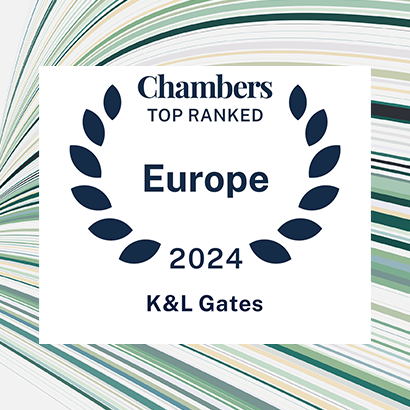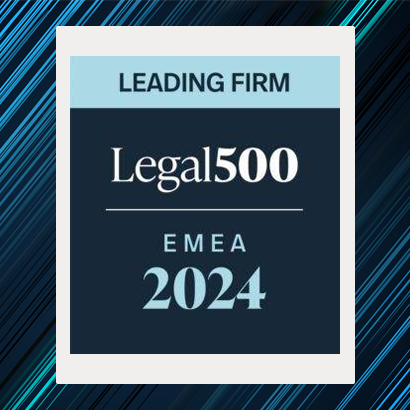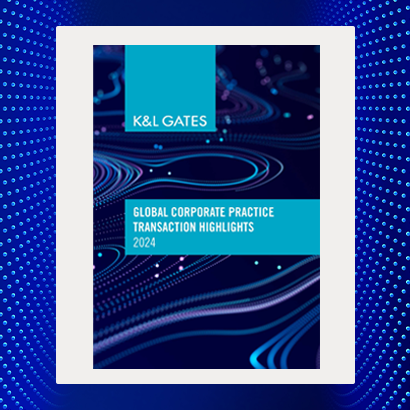Industries & Services
Academic Medical Centers (AMCs)
Advertising and Marketing
Aerospace
Agribusiness
Agtech
American Indian Law
Anti-Bribery and Anti-Corruption
Anti-Money Laundering (AML)
Antitrust, Competition, and Trade Regulation
Appellate Litigation
Artificial Intelligence
Asset Management and Investment Funds
Automotive
Aviation
Aviation Finance
Banking
Benefits and ESOPs
Betting and Gaming
Biometric Data Compliance and Defense
Broker-Dealers
Cannabis
Capital Markets
Class Action Litigation Defense
Clinical Integration and Accountable Care
Cloud, Internet, and E-Commerce
Collective Labor and Works Councils
Commercial Disputes
Commercial Ownership, Leasing, and Management
Construction and Infrastructure
Construction and Infrastructure Dispute Resolution
Construction and Infrastructure Project Funding
Consumer Beauty and Aesthetics
Consumer Product Safety
Consumer Products
Corporate
Corporate and Acquisition Finance
Corporate Governance
Corporate Sustainability
Cyber Preparedness and Response and Privacy Compliance
Cybersecurity and Privacy
Data Analytics
Data and Privacy Transactions
Data Protection, Privacy Cross-Border, and Industry Advice
Data Protection, Privacy, and Security
Debt Capital Markets
Derivatives
Digital Assets, Blockchain Technology and Cryptocurrencies
Digital Health
Distressed Real Estate
E-Discovery Analysis and Technology (e-DAT)
Emerging Growth and Venture Capital
Emerging Managers, Seed Investors, and GP Stakes
Employment Disputes and Investigations
Employment Issues in Business Transactions
Energy
Energy Disputes
Energy Finance
Energy Storage and Distributed Resources
Energy, Infrastructure, and Resources
Environment, Land, and Natural Resources
Environmental Social Governance (ESG)
ERISA
ESG - Corporate Governance
ESG - Sustainability and Renewable Energy
ESG - Sustainable Agriculture
ESG - Sustainable Investing
Estate Planning and Trusts & Estates
European Regulatory
Exchange-Traded Products
Executive Compensation
Family Offices
Federal, State, and Local False Claims Act
Finance
Financial Institutions and Services Litigation
Financial Services
Financial Services Policy
Fine Art and Cultural Property
Fintech
Fintech Lending
Fisheries and Aquaculture
Food and Beverage
Food, Drugs, Medical Devices, and Cosmetics (FDA)
Franchising
Franchising Commercial Transactions and Corporate Counsel
Fund Formation
General Manufacturing
Global Advisory
Global Distribution
Global Employer Solutions
Global Financial Services Regulation
Global Location Strategies
Government and Public Procurement
Government Contracts and Procurement Policy
Hardware and Semiconductors
Health Care and FDA
Health Care Fraud and Abuse (U.S.)
Health Care Payor-Provider Disputes (U.S.)
Health Care Sector
Health Care Transactions
Hedge Funds
Higher Education Institutions
Hospitals and Health Systems
Human Resource Advice and Compliance
Hydrogen
Immersive Technology and Interactive Entertainment
Immigration
Industrial and Commercial Coatings
Institutional Investors
Insurance Recovery and Counseling
Intellectual Property
Internal Investigations
International Arbitration
International Trade: CFIUS, Sanctions, and Export Controls
Investment Advisers
Investment Funds
Investment Transactions
Investor-State Arbitration
IP Litigation
IP Procurement and Portfolio Management
Islamic Finance
Lab, Pharmacy, and Durable Medical Equipment
Labor, Employment, and Workplace Safety
Land Use, Planning, and Zoning
Life Sciences
Limited Partners
Liquefied Natural Gas
Litigation and Dispute Resolution
Luxury Products and Fashion
Major Infrastructure: Projects and Public-Private Partnerships
Manufacturing
Manufacturing Technologies
Maritime
Maritime Compliance
Maritime Disputes
Maritime Regulatory
Maritime Transactions and Finance
Mass Tort
Medicare Reimbursement and Enrollment
Mergers and Acquisitions
Metals Manufacturing and Fabrications
Mining and Metals
Nonprofit Organizations
OFCCP and Affirmative Action Compliance
Offshore Construction
Offshore Wind Energy
Oil and Gas
Opportunity Zones (OZs)
Payments, Banking Regulation, and Consumer Financial Services
Pharma and BioPharma Litigation
Pharmaceuticals, Biologics, and Medical Devices
Policy and Regulatory
Portfolio Management, Trading, and Compliance
Post-Acute/Senior Housing and Care
Post-Grant Patents
Power
Power Generation and Transmission
Private Equity
Private Equity Funds
Private Equity Transactions
Product Liability
Professional Liability
Proptech
Public Companies
Public Finance
Public Policy and Law
Rail and Roads
Rail Finance
Real Estate
Real Estate Acquisitions and Dispositions
Real Estate Development and Construction
Real Estate Finance
Real Estate Funds
Real Estate Joint Ventures
Real Estate Litigation
Renewables
Resort, Hospitality, and Leisure
Restructuring and Insolvency
School Districts
Securities and Transactional Litigation
Securities Compliance and Reporting
Securities Enforcement / Financial Regulatory Enforcement
Securitization and Structured Finance
Social Media Law
Space
Specialty Chemicals
Sports
Sustainable Economy
Tax
Technology
Technology Transactions and Sourcing
Telecommunication and Mobile
Telecommunication Infrastructure
The Alternative Investment Market (AIM)
Transportation (Manufacturing)
Transportation and Logistics
Transportation Finance
Transportation Infrastructure
U.S. Congressional Investigations
U.S. National Security Law and Policy
U.S. Registered Investment Companies
UCITS
Utilities
Wage and Hour
Water and Wastewater
White Collar Defense and Investigations
Workplace Safety
Title
Administrative Assistant
Administrative Chief Officer
Associate
Consultant
Counsel
Government Affairs Advisor
Government Affairs Analyst
Government Affairs Counselor
Lawyer
Legal Adviser
Legal Support Staff
Of Counsel
Paralegal
Partner
Patent Agent
Patent Attorney
Patent Technical Specialist
Practice Support Lawyer
Project Manager
Senior Associate
Senior Of Counsel
Special Counsel
Staff Lawyer
Trainee
Office
Austin
Beijing
Berlin
Boston
Brisbane
Brussels
Charleston
Charlotte
Chicago
Dallas
Doha
Dubai
Dublin
Fort Worth
Frankfurt
Harrisburg
Hong Kong
Houston
Kansas City
London
Los Angeles
Luxembourg
Melbourne
Miami
Milan
Munich
Nashville
New York
Newark
Orange County
Palo Alto
Paris
Perth
Pittsburgh
Portland
Raleigh
Research Triangle Park
San Francisco
Sao Paulo
Seattle
Seoul
Shanghai
Singapore
Sydney
Taipei
Tokyo
Washington DC
Wilmington
Region
Asia
Australia
Europe
Middle East
South America
United States
Bar Admission
Admitted only as indicated below. Not admitted in the District of Columbia. Supervised by a member of the D.C. Bar.
Admitted to Practice in United Kingdom
Advocate and Solicitor, Singapore
Arbitrator of the Chinese Arbitration Association, Taiwan
Attorney of the High Court of South Africa
Bar Council of India
Bar of Alabama
Bar of Alaska
Bar of Arizona
Bar of Brussels
Bar of Brussels (List B)
Bar of California
Bar of Colorado
Bar of Connecticut
Bar of Delaware
Bar of District of Columbia
Bar of Florida
Bar of Frankfurt
Bar of Georgia
Bar of Germany
Bar of Hawaii
Bar of Idaho
Bar of Illinois
Bar of Iowa
Bar of Israel
Bar of Istanbul
Bar of Jordan
Bar of Kansas
Bar of Kentucky
Bar of Louisiana
Bar of Luxembourg (List I)
Bar of Maine
Bar of Maryland
Bar of Massachusetts
Bar of Michigan
Bar of Mississippi
Bar of Missouri
Bar of Montana
Bar of New Hampshire
Bar of New Jersey
Bar of New York
Bar of North Carolina
Bar of Ohio
Bar of Oklahoma
Bar of Oregon
Bar of Paris
Bar of Pennsylvania
Bar of People's Rep. of China
Bar of Rhode Island
Bar of Rome
Bar of Singapore
Bar of South Africa
Bar of South Carolina
Bar of Spain
Bar of Spain (Inactive)
Bar of Taiwan
Bar of Tennessee
Bar of Texas
Bar of Utah
Bar of Venezuela
Bar of Vermont
Bar of Virginia
Bar of Washington
Bar of West Virginia
Bar of West Virginia (Active Not Practicing)
Bar of Wisconsin
Barrister and Solicitor of the High Court of New Zealand (Non-practicing)
Barrister and Solicitor, Law Society of Ontario, Canada
Barrister and Solicitor, New Zealand
Barrister-at-Law, Lincoln's Inn, United Kingdom
Barrister, England and Wales (non-practising)
Barrister, Inner Temple
Barrister, Middle Temple
Beirut Bar
Benrishi registered with the Japan Patent Attorneys Association
Brazil
Certified accountant admitted to practice in front of tax courts
Certified Evaluation & Management Auditor (CEMA)
Certified Medical Technologist (MT-ASCP)
Certified Practising Accountant
Certified Professional Coder (CPC)
Certified Professional Compliance Officer (CPCO)
Certified Public Accountant
Chamber of Tax Advisors Munich
Chamber of Tax Advisors of Hesse
Chartered Tax Adviser (completed CTA 1, 2A and 2B)
China National Intellectual Property Administration (Chinese Patent Bar)
Czech Bar Association
Dubai Department of Legal Affairs
Dubai Register of Legal Consultants
Emergency Medical Technicians-Basic (EMT-B)
Employed Barrister, England & Wales
England & Wales - Registered Foreign Lawyer
European Patent Office (EPO)
European Union Intellectual Property Office
Federal Court of Australia
Foreign Legal Consultant of the Indonesian Bar Association
Foreign Legal Consultant, São Paulo, Brazilian Bar Association
Foreign Legal Consultant, State of Texas, authorized to practice law in England and Wales
Foreign Practitioner permitted to practice Singapore Law (commercial, corporate finance and corporate) and foreign law in Singapore
German lawyer, Frankfurt am Main
German Patent and Trademark Office (GPTO)
Grand Court of the Cayman Islands
Greek Qualified Lawyer
High Court of Australia
High Court of New Zealand
Illinois Certified Public Accountant
Italian Bar
Italian Court of Cassation
Japan (Dai-ichi Tokyo Bar Association (Gaikokuho-Jimu-Bengoshi - Registered Foreign Lawyer))
Japan (Dai-ichi Tokyo Bar Association)
Japan (Dai-ni Tokyo Bar Association (Gaikokuho-Jimu-Bengoshi - registered foreign lawyer))
Japan (Dai-ni Tokyo Bar Association)
Japan (Tokyo Bar Association)
Korean Patent Bar
Law Society of Ireland
Law Society of Ireland (non-practising)
Law Society of Scotland
Law Society of Upper Canada
Legal Advisor, Warsaw
Lodi Bar
Luxembourg Bar
Luxembourg Qualified Lawyer (List IV)
Mexico
Milan Bar
North Gauteng High Court, Republic of South Africa
Not Admitted in California
Not Admitted in Illinois
Not admitted in Japan
Not Admitted in Massachusetts
Not Admitted in New York
Not Admitted in North Carolina
Not Admitted in Oregon
Not Admitted in Pennsylvania
Not Admitted in South Carolina
Not Admitted in Tennessee
Not Admitted in Texas
Not Admitted in Washington
QICCA Roster of Arbitrators in Doha
Registered as a Foreign Legal Consultant in California
Registered Australian Patent Attorney
Registered Australian Trade Marks Attorney
Registered Foreign Lawyer
Registered Foreign Lawyer with the Law Society of Singapore
Registered Foreign Lawyer with the Solicitors Regulation Authority in England and Wales
Registered Foreign Legal Consultant in Brazil
Registered Foreign Legal Consultant, The Republic of Korea
Registered New Zealand Patent Attorney
SCCA Roster of Arbitrators in Riyadh
Senior Courts of England and Wales
Solicitor and Barrister of the Supreme Court of New South Wales
Solicitor and Barrister of the Supreme Court of South Australia
Solicitor of the Senior Courts of England and Wales
Solicitor of the Supreme Court of Gibraltar
Solicitor-Advocate (Higher Rights Civil)
Solicitor, Brussels Bar (Dutch section, EU list)
Solicitor, England and Wales (non-practising)
Solicitor, England and Wales (with Higher Rights of Audience in Civil and Criminal Courts)
Solicitor, Finland
Solicitor, Hong Kong
Solicitor, Ireland
Solicitor, Queensland, Australia
Solicitor, Scotland
State Intellectual Property Office of the People's Republic of China
Supreme Court of England and Wales
Supreme Court of New South Wales
Supreme Court of Northern Territory
Supreme Court of Queensland
Supreme Court of South Australia
Supreme Court of Tasmania
Supreme Court of the Australian Capital Territory
Supreme Court of Victoria
Supreme Court of Western Australia
Trainee at Italian Bar
Trainee at Perugia Bar
Trainee at the Bar of Foggia
Trainee at the Milan Bar
U.S. Customs Broker
Unified Patent Court
United States Patent and Trademark Office
Vietnamese Law Qualified Lawyer
School
Aalto University
AAPC
Aberdeen University
Adelphi University
Admission Board New South Wale
Aix en Provence Law Faculty
Aix-Marseille University
Akita University
Albany Law School
Albion College
Alderson-Broaddus University
Allegheny College
American University
American University of Beirut
American University Washington College of Law
Amherst College
Amity Law School
Andrés Bello Catholic University
Appalachian State University
Aristotle University of Thessaloniki Law School
Arizona State University
Arizona State University College of Law
Arizona State University Sandra Day O'Connor Law School
Assumption College
Auburn University
Augustana College
Austin Peay State University
Australian Catholic University
Australian Graduate School of Management
Australian Institute of Company Directors
Australian National University
Australian Restructuring Insolvency and Turnaround Association
Bard College at Simon's Rock
Barrett, The Honors College at Arizona State University
Baruch College
Bates College
Baylor University
Baylor University School of Law
Bayreuth
Beijing Foreign Studies University
Beijing Normal University
Belmont University
Belmont University College of Law
Benedictine University
Benjamin N. Cardozo School of Law
Bentley University
Berklee College of Music
Berlin
Bilkent University
Binghamton University
Birmingham City University
Birmingham-Southern College
Bloomsburg University
Bocconi University
Bocconi University School of Law
Bond University
Boston College
Boston College Law School
Boston University
Boston University School of Law
Bowdoin College
Bowling Green State University
BPP Law School
BPP Law School, Waterloo
BPP University
Bradley University
Brandeis University
Brasenose College, Oxford University
Brigham Young University
Brigham Young University, Clark Law School
Brigham Young University, Idaho
Brooklyn College
Brooklyn Law School
Brown University
Bryn Mawr College
Bucknell University
Buena Vista University
Cal State University, Northridge
California Polytechnic State University
California State University
California State University, Chico
California State University, East Bay
California State University, Long Beach
California State University, Sacramento
California State University, San Marcos
California University of Pennsylvania
Calvin College
Cambridge University
Campbell University
Campbell University, Norman Adrian Wiggins School of Law
Canisius College
Capital University Law School
Carleton College
Carnegie Mellon University
Carthage College
Case Western Reserve University
Case Western Reserve University School of Law
Catholic University of America
Catholic University of America Columbus School of Law
Catholic University of the Sacred Heart of Milan
Central Michigan University
Centre College
CEU San Pablo University
Chapman University Fowler School of Law
Charles University, Prague
Charleston School of Law
Chicago-Kent College of Law, Illinois Institute of Technology
China University of Political Science and Law
Chinese School of Oriental & African Studies, University of London
Christ University
Chung Yuan University
Chuo University
CISI/École Supérieure des Affaires
City College of New York
City University of Hong Kong
City University of New York
Civil Aviation University of China
Claremont Graduate University
Claremont McKenna College
Clemson University
Coastal Carolina University
Colby College
Colgate University
College of Charleston
College of Europe, Bruges
College of Law
College of Law
College of Law of England & Wales
College of Law, Australia
College of Law, Birmingham
College of Law, Brisbane
College of Law, Chester
College of Law, Guildford
College of Law, Lancaster Gate
College of Law, London
College of Law, New South Wales
College of Law, Sydney
College of Law, Victoria
College of New Jersey
College of the Holy Cross
College of William and Mary
Cologne
Colorado State University
Columbia College
Columbia College of Columbia University
Columbia Law School
Columbia University
Communication University of China
Cornell Law School
Cornell University
CPA Australia
Creighton University
Creighton University School of Law
Curtin University
Dalian Institute of Chemical Physics Chinese Academy of Sciences
Dartmouth College
Davidson College
Deakin University
Denison University
DePaul University
DePaul University College of Law
DePaul University, Kellstadt Graduate School of Business
Dickinson College
Dickinson School of Law of The Pennsylvania State University
Diplomatic Academy of Vietnam
Diplomatic School of the Italian Government
District Court Bonn
Doshisha University
Doshisha University Graduate School of Law
Downing College, Cambridge
Drake University
Dresden Higher Regional Court
Drew University
Drexel University
Drexel University College of Law
Dublin City University
Duke University
Duke University School of Law
Duquesne University
Duquesne University School of Law
Durham University
Düsseldorf
Dutchess Community College, SUNY
East Carolina University
East China University of Political Science and Law
East China University of Politics and Law
Eastern Washington University
EBS University Law School, Wiesbaden
Ecole Normale Supérieure de Cachan
EDARA
Elon University
Elon University School of Law
EM Lyon Business School
Emory University
Emory University School of Law
Erasmus University Rotterdam
Ernst-Moritz-Arndt-University of Greifswald
Erskine College
ESCP Europe
European Patent Office
European University Viadrina Frankfurt
Faculté de Droit de Rennes
Fairfield University
Fergusson College
FINSIA Financial Services Institute of Australasia
Fisk University
Florida A&M University
Florida Coastal School of Law
Florida International University
Florida State University
Florida State University College of Law
Fordham University
Fordham University School of Law
Frankfurt a.M.
Franklin Pierce Law Center
Free University of Berlin
French Institute of Petroleum
Friedrich-Alexander-University Erlangen-Nürnberg
Frostburg State University
Fu Jen Catholic University
Fudan University
Furman University
Garrigues Legal Institute
Geneva College
George Fox University
George Mason University
George Mason University School of Law
George Mason University School of Law
George Washington University
George Washington University Law School
Georgetown University
Georgetown University Law Center
Georgetown University School of Foreign Service
Georgia Institute of Technology
Georgia State University
Gettysburg College
Goethe-University of Frankfurt
Golden Gate University School of Law
Gonzaga University
Gonzaga University School of Law
Gordon College
Governance Institute of Australia
Governance Institute of Australia
Griffith University
Grove City College
Hamburg
Hamilton College
Hampshire College
Hampton Institute (now Hampton University)
Hannover
Harding University
Harvard College
Harvard Law School
Harvard School of Public Health
Harvard University
Haverford College
HEC Paris
Heidelberg
Higher Regional Court Bamberg
Higher Regional Court Düsseldorf
Higher Regional Court in Lüneburg
Higher Regional Court of Berlin
Higher Regional Court of Braunschweig
Higher Regional Court of Celle
Higher Regional Court of Frankfurt/Main
Higher Regional Court of Hamburg
Higher Regional Court of Koblenz
Higher Regional Court of Munich
Higher Regional Court of Naumburg
Higher Regional Court of Oldenburg
Higher Regional Court of Regensburg
Higher Regional Court of Schleswig
Higher Regional Court of Stuttgart
Hillsdale College
Hiram College
Hobart College
Hofstra University
Hofstra University School of Law
Holmesglen
Hong Kong University of Science and Technology
Howard University
Howard University School of Law
Humboldt University of Berlin
Humboldt University, Berlin
Idaho State University
IE Business School
Illinois State University
Illinois Wesleyan University
Imperial College
Indian Institute of Technology
Indiana University
Indiana University Maurer School of Law
Indiana University of Pennsylvania
Indiana University Robert H. McKinney School of Law
Inns of Court School of Law
Insolvency Practitioners Association (now ARITA)
Institute of Bankers of Ireland
Institute of Business Law of Aix en Provence
Institute of Islamic Banking and Insurance
Institute of Political Studies, University of Bordeaux
Jagellonian University
James Madison University
Jean Moulin University Lyon 3
Johann-Wolfgang-Goethe University Frankfurt/Main
Johannes Gutenberg University of Mainz
John Carroll University
John Marshall Law School
Johns Hopkins School of Advanced International Studies
Kalamazoo College
Kaplan Law School
Kaplan Professional
Karlsruhe
Karolinksa Institutet
Katholieke Universiteit Leuven
Keele University
Keio University
Keio University Law School
Kent State University
Kenyon College
Kettering University
King's College
King's College of London School of Law
King's College, London
King's College, University of Cambridge
King's College, University of London
Kingston University
Korea Advanced Institute of Science and Technology
Kyoto University
La Trobe University
Lady Margaret Hall, University of Oxford
Lafayette College
Lancaster University
Law Extension Committee - University of Sydney
Law Society of Ireland
Law Society of Ireland
Law Society of South Australia
Lawrence University
Lehigh University
Leiden Universiteit
Lenoir-Rhyne University
Leo Cussen Centre for Law
Lewis & Clark College
Lewis & Clark Law School
Lewis and Clark College Northwestern School of Law
Libera Universita Internazionale degli Studi Sociali
Lipscomb University
London Business School
London Metropolitan University
London School of Economics and Political Science
London School of Economics Law
Louisiana State University
Lower Saxony
Loyola College in Maryland
Loyola Law School - Los Angeles
Loyola Marymount University
Loyola University - Chicago
Loyola University Chicago School of Law
Loyola University New Orleans
LPM Institute
Ludwig Maximilian University of Munich
LUMSA University
Lund University
Lynchburg College
Maastricht School of Management
Maastricht University
Macalester College
Macquarie University
Magdeburg
Maison d'Education de la Légion d'Honneur
Manchester Metropolitan University
Manhattan College
Marquette University
Marquette University Law School
Martin-Luther-University Halle-Wittenberg
Mary Washington College
Maryville University
Massachusetts Institute of Technology
Massey University
McGill University
McMaster University
McNeese State University
Melbourne Business School
Melbourne Law School, University of Melbourne
Mercer University School of Law
Messiah College
Messiah University
Miami University (Ohio)
Michigan State University
Michigan State University, College of Law
Middle Tennessee State University
Middlebury College
Mills College
MIT Media Lab
Monash University
Montclair State University
Mount St. Mary's University
Mu'tah University
Munich
Murdoch University
Mykolas Romeris University
Nankai University
Nashville School of Law
National Central University
National Chengchi University
National Chiao-Tung University
National Chung-Cheng University
National Taipei University
National Taiwan University
National University of Singapore
National Yang Ming Chiao Tung University
Naval Justice School
New Jersey Institute of Technology
New York Law School
New York University
New York University School of Law
Newcastle University, Newcastle upon Tyne
Newman University
North Carolina Central University
North Carolina Central University School of Law
North Carolina State University
North Park University
Northeastern University
Northeastern University School of Law
Northern Illinois University College of Law
Northern Michigan University
Northwestern University
Northwestern University Kellogg School of Management
Northwestern University Pritzker School of Law
Nottingham Law School
Nottingham Trent University
Nuremberg
Oberlin College
Occidental College
Ohio University
Oldenburg
Oxford Brookes University
Oxford Institute of Legal Practice
Pace University
Pace University School of Law
Pacific Lutheran University
Paris Bar School (EFB)
Paris Institute of Political Studies
Paris-Est Créteil Val de Marne
Passau
Patrick Henry College
Peking University
Penn State Law
Pennsylvania State University
Pepperdine University
Pepperdine University School of Law
Petroleum University of Technology
Pierre-Mendès-France University
Pittsburg State University
Pomona College
Pontificia Universidade Catolica
Portland State University
Princeton University
Providence College
Purdue University
Queen Mary University of London, School of Law
Queen's University at Kingston
Queen's University Belfast
Queensland University of Technology
Quinnipiac University
Radford University
Raoul Wallenberg Institute, Lund University
Regensburg
Regional Court of Marburg
Renmin University of China
Rheinische Friedrich-Wilhelms University
Rhodes College
Rice University
Ripon College
RMIT University
Rochester Institute of Technology
Rockhurst University
Roma Tre University, Faculty of Law
Royal Military College
Royal Society of Art, London
Rutgers School of Law at Camden
Rutgers School of Law at Newark
Rutgers University
Saarland University
Sacred Heart University
Saint Joseph University of Beirut
Salem State College
Salisbury University
Salmon P. Chase College of Law
San Diego State University
San Jose State University
Santa Clara University
Santa Clara University School of Law
Sciences Po Law School
Scripps College
Seattle Pacific University
Seattle University
Seattle University School of Law
Securities Institute of Australia
Seoul National University
Seton Hall University
Seton Hall University School of Law
Sewanee: The University of the South
Shanghai Foreign Language Institute
Shanghai University
Shanghai University of Finance and Economics
Sherbrooke University
Shippensburg University
Sichuan University
Simmons College
Simon Fraser University
Simpson University
Singapore Management University
SIT Graduate Institute
Skidmore College
Slippery Rock University
Smith College
Soochow University
Soong Sil University
Sophia University
South China University of Technology
South Texas College of Law
Southern Cross University
Southern Illinois University
Southern Methodist University
Southern Methodist University Dedman School of Law
Southwestern Law School
Southwestern University
Spring Hill College
St. Bonaventure University
St. Edward's University
St. John Fisher College
St. John's University
St. John's University School of Law
St. Mary's College of Maryland
Stanford Graduate School of Business, Advanced Management College
Stanford Law School
Stanford University
State of Bavaria
State of Hesse
State University of New York at Albany
State University of New York at Buffalo
State University of New York at Buffalo Law School
Stetson University College of Law
Stonehill College
Suffolk University
Suffolk University Law School
Suffolk University Sawyer School of Management
SUNY at Geneseo
Swarthmore College
Swinburne University of Technology
Syracuse University
Syracuse University College of Law
Technological University Dublin
Tel Aviv University School of Law
Temple University
Temple University Beasley School of Law
Texas A&M University
Texas Christian University
Texas Tech University School of Law
The Accord Group
The Chinese University of Hong Kong
The Citadel
The College of Law, York
The Hague Academy of International Law
The Johns Hopkins University
The Johns Hopkins University Bloomberg School of Public Health
The Legal Training and Research Institute of Japan
The Ohio State University
The Ohio State University Moritz College of Law
The State University of New York at Binghamton
The University of Auckland
The University of Chicago
The University of Chicago Law School
The University of Hong Kong
The University of Hull
The University of Kansas
The University of Liverpool
The University of New South Wales
The University of Texas
The University of Texas at Arlington
The University of Texas at Austin
The University of Texas at Dallas
The University of Texas School of Law
The University of the South
The University of Tokyo
The University of Tokyo, School of Law
The Wharton School
Thomas Jefferson School of Law
Thomas M. Cooley Law School
Tokyo Metropolitan University
Tongji University, Shanghai
Touro College
Touro College, Jacob D. Fuchsberg Law Center
Trevecca Nazarene University
Trinity College
Trinity College - Dublin
Trinity Lutheran College
Troy State University
Tsinghua University
Tufts University
Tufts University - The Fletcher School of Law and Diplomacy
Tufts University College of Engineering
Tulane Law School
Tulane University
U.S. Naval War College
Union College
United States Coast Guard Academy
United States Merchant Marine Academy
United States Naval Academy
Universidad de Alicante
Universidad de Deusto
Universidad Pontificia Comillas
Universita degli Studi di Roma
Universita` Cattolica del Sacro Cuore
Universite Catholique de Louvain
Universite de Grenoble
Université de Provence
Université Libre de Bruxelles, Belgium
University College Cork
University College Dublin
University College London
University Lille II
University LUISS Guido Carli Rome
University of Aberdeen
University of Adelaide
University of Akron
University of Akron School of Law
University of Alabama
University of Alabama at Huntsville
University of Alaska Fairbanks
University of Albany
University of Amsterdam
University of Arizona
University of Arizona, James E. Rogers College of Law
University of Arkansas
University of Augsburg
University of Auvergne, Clermont-Ferrand
University of Baltimore School of Law
University of Bari
University of Bayreuth
University of Bergen
University of Birmingham
University of Bologna
University of Bonn
University of Bonn Faculty of Law
University of Bristol
University of British Columbia
University of Brussels
University of Burgundy
University of California
University of California at Los Angeles (UCLA)
University of California College of the Law, San Francisco
University of California Hastings College of the Law
University of California Irvine School of Law
University of California San Francisco
University of California, Berkeley
University of California, Berkeley School of Law
University of California, Berkeley School of Law
University of California, Davis
University of California, Davis School of Law
University of California, Irvine
University of California, Los Angeles (UCLA) School of Law
University of California, Riverside
University of California, San Diego
University of California, Santa Barbara
University of Cambridge
University of Canterbury
University of Cape Town, South Africa
University of Central Florida
University of Central Lancashire
University of Central Oklahoma
University of Cincinnati College of Law
University of Colorado
University of Colorado School of Law
University of Connecticut
University of Copenhagen
University of Dallas
University of Damascus
University of Dayton
University of Dayton School of Law
University of Delaware
University of Delhi
University of Denver
University of Denver Sturm College of Law
University of Dundee
University of East Anglia
University of Edinburgh
University of Es-Senia
University of Essex
University of Exeter
University of Exeter School of Law
University of Florida
University of Florida Levin College of Law
University of Frankfurt
University of Freiburg
University of Georgia
University of Georgia School of Law
University of Giessen, Department of Law
University of Giessen, Germany
University of Glasgow
University of Gottingen
University of Göttingen
University of Greenwich
University of Hagen
University of Hamburg
University of Hanover
University of Hawai’i at Manoa
University of Hawaii
University of Hawaii, Richardson School of Law
University of Heidelberg
University of Helsinki
University of Houston Law Center
University of Idaho
University of Illinois
University of Illinois at Chicago
University of Illinois at Chicago School of Law
University of Illinois at Urbana – Champaign
University of Illinois College of Law
University of Illinois School of Labor and Employment Relations
University of International Business and Economics
University of International Relations
University of Iowa
University of Iowa College of Law
University of Jan Kochanowski
University of Johannesburg
University of Jordan
University of Kansas School of Law
University of Kent
University of Kentucky
University of Kentucky College of Law
University of Kiel
University of Konstanz School of Law
University of La Verne
University of Lausanne
University of Law
University of Law, Birmingham
University of Law, London
University of Law, London Bloomsbury
University of Law, Manchester
University of Law, Moorgate
University of Leeds
University of Leicester
University of Leipzig
University of Limerick
University of Limoges
University of London
University of Louvain-la-Neuve
University of Macerata
University of Maine School of Law
University of Mainz
University of Manchester
University of Marburg
University of Maryland
University of Maryland at College Park
University of Maryland School of Law
University of Maryland School of Medicine
University of Massachusetts
University of Massachusetts at Amherst
University of Massachusetts Lowell
University of Melbourne
University of Memphis
University of Memphis Cecil C. Humphreys School of Law
University of Memphis Cecil C. Humphreys School of Law
University of Messina
University of Miami
University of Miami School of Law
University of Michigan
University of Michigan Law School
University of Milan
University of Milan Law School (Italy)
University of Minnesota
University of Minnesota Law School
University of Mississippi
University of Mississippi School of Law
University of Mississippi School of Law
University of Missouri-Columbia
University of Missouri-Kansas City School of Law
University of Missouri, St. Louis
University of Montana
University of Munich
University of Münster
University of Navarra
University of Nevada, Las Vegas
University of Nevada, Reno
University of New England
University of New England, Australia
University of New Hampshire School of Law
University of Newcastle
University of North Carolina
University of North Carolina at Asheville
University of North Carolina at Chapel Hill
University of North Carolina at Chapel Hill School of Law
University of North Carolina at Charlotte
University of North Carolina at Charlotte
University of North Carolina at Greensboro
University of North Carolina Kenan-Flagler Business School
University of North Carolina, Wilmington
University of North Dakota
University of Northampton
University of Notre Dame
University of Notre Dame Law School
University of Nottingham
University of Oklahoma
University of Oklahoma College of Law
University of Oregon
University of Oregon School of Law
University of Orleans
University of Otago, New Zealand
University of Oxford
University of Padua, Italy
University of Paris
University of Paris - Dauphine
University of Paris 2 Panthéon-Assas
University of Paris I - Panthéon-Sorbonne
University of Paris II - Panthéon-Assas
University of Paris V - Rene Descartes
University of Paris X - Nanterre
University of Paris XI
University of Paris XI - Sud
University of Paris XIII
University of Paris-Est
University of Paris, La Sorbonne
University of Passau
University of Pavia
University of Pennsylvania
University of Pennsylvania Carey Law School
University of Pennsylvania Law School
University of Perugia
University of Pittsburgh
University of Pittsburgh at Johnstown
University of Pittsburgh School of Law
University of Poitiers
University of Portland
University of Potsdam
University of Punjab
University of Queensland
University of Reading
University of Redlands
University of Regensburg
University of Rennes 1
University of Rhode Island
University of Richmond
University of Richmond T.C. Williams School of Law
University of Rochester
University of Rome La Sapienza
University of Rostock
University of Salento
University of San Diego
University of San Diego School of Law
University of San Francisco
University of San Francisco School of Law
University of Saskatchewan
University of Science and Technology, Beijing
University of Sheffield
University of Singapore
University of South Alabama
University of South Carolina
University of South Carolina School of Law
University of South Carolina, School of Earth, Ocean, and Environment
University of Southampton
University of Southern California
University of Southern California Gould School of Law
University of Southern California Law School
University of Southern Queensland
University of St. Thomas
University of Strasbourg
University of Strasbourg, London School of Economics
University of Strathclyde
University of Surrey
University of Sussex
University of Sydney
University of Tasmania
University of Technology
University of Technology, Sydney
University of Tennessee
University of Tennessee College of Law
University of Texas Rio Grande Valley
University of the Witwatersrand, Johannesburg
University of Toledo College of Law
University of Toronto
University of Toulouse
University of Trento
University of Tübingen
University of Tulsa College of Law
University of Turin
University of Utah
University of Utah College of Law
University of Vermont
University of Versailles
University of Victoria
University of Virginia
University of Virginia School of Law
University of Virginia's College at Wise
University of Wales
University of Warsaw
University of Warwick
University of Washington
University of Washington School of Law
University of West London
University of West Los Angeles School of Law
University of Western Australia
University of Western Ontario
University of Western Ontario
University of Wisconsin Law School
University of Wisconsin-Madison
University of Wisconsin, Milwaukee
University of Wollongong
University of Wolverhampton, United Kingdom
University of York
University of Zurich
Uppsala University
Utrecht University
Valparaiso University School of Law
Vanderbilt Law School
Vanderbilt University
Vanderbilt University, Owen Graduate School of Management
Vassar College
Vermont Law School
Versailles Bar School
Victoria University
Victoria University of Wellington
Villanova University
Villanova University School of Law
Virginia Commonwealth University
Virginia Polytechnic Institute and State University
Wake Forest University
Wake Forest University School of Law
Waseda University
Washington and Jefferson College
Washington and Lee University
Washington and Lee University School of Law
Washington State University
Washington University
Washington University in St. Louis
Washington University School of Law
Wayne State University Law School
Waynesburg University
Wellesley College
Wesleyan University
West Virginia University
West Virginia University College of Law
Western Kentucky University
Western New England College
Western Oregon University
Western State College of Law
Western Sydney University
Western Washington University
Wheaton College
Wheeling Jesuit College
Whitman College
Whittier Law School
Widener University Commonwealth Law School
Widener University Delaware Law School
Wiesbaden
Willamette University College of Law
William and Mary School of Law
William Mitchell College of Law
William Paterson University
Williams College
Winthrop University
Worcester College, Oxford
Worcester Polytechnic Institute
Xavier University
Xiamen University Law School
Yale Law School
Yale University
Yonsei University
York University
York University Osgoode Hall Law School
Youngstown State University
Language
Afrikaans
American Sign Language
Arabic
Arabic (Egyptian Dialect)
Armenian
Bahasa (Indonesian)
Bahasa (Malaysia)
Bulgarian
Chinese
Chinese (Cantonese)
Chinese (Mandarin)
Chinese (Mandarin/Putonghua)
Chinese (Shanghai)
Czech
Danish
Dutch
English
Farsi (Persian)
Finnish
French
Fujianese
German
Greek
Gujarati
Hakka
Hebrew
Hindi
Hokkien
Hungarian
Italian
Japanese
Korean
Latin
Lithuanian
Luxembourgish
Malay
Persian
Polish
Portuguese
Punjabi
Romanian
Russian
Serbo-Croatian
Shanghainese
Slovak
Spanish
Swedish
Tagalog (Philippines)
Taiwanese
Tamil (Ceylon)
Tamil (India)
Thai
Turkish
Ukrainian
Urdu (Pakistan)
Vietnamese
Court Admission
Advocate and Solicitor, Supreme Court of Singapore
Appellate Division of the New York Supreme Court
Appellate Division of the New York Supreme Court, Third Judicial Department
Commonwealth Court of Pennsylvania
Court of Appeal for Ontario
Court of Appeals of Virginia
Court of Common Pleas of Allegheny County
District of Columbia Court of Appeals
Dubai International Financial Centre Courts
Eastern Caribbean Supreme Court (British Virgin Islands) (non-practicing)
Federal Court of Australia
German Federal Court of Justice (BGH) in nullity appeal proceedings
German Federal Patent Court (BPatG)
High Court of Australia
Hong Kong High Court
International Criminal Court (Assistant to Counsel)
Senior Courts of England and Wales
Singapore International Commercial Court
Superior Court of Justice
Superior Court of Massachusetts
Superior Court of Pennsylvania
Supreme Court of New South Wales
Supreme Court of the United States
Supreme Court of Victoria
United States Army Court of Criminal Appeals
United States Bankruptcy Court for the Central District of California
United States Bankruptcy Court for the District of Maryland
United States Bankruptcy Court for the Eastern District of California
United States Bankruptcy Court for the Eastern District of North Carolina
United States Bankruptcy Court for the Eastern District of Texas
United States Bankruptcy Court for the Eastern District of Washington
United States Bankruptcy Court for the Middle District of Florida
United States Bankruptcy Court for the Middle District of North Carolina
United States Bankruptcy Court for the Middle District of Tennessee
United States Bankruptcy Court for the Northern District of California
United States Bankruptcy Court for the Northern District of Florida
United States Bankruptcy Court for the Northern District of Ohio
United States Bankruptcy Court for the Northern District of Texas
United States Bankruptcy Court for the Southern District of Florida
United States Bankruptcy Court for the Southern District of New York
United States Bankruptcy Court for the Southern District of Texas
United States Bankruptcy Court for the Western District of North Carolina
United States Bankruptcy Court for the Western District of Oklahoma
United States Bankruptcy Court for the Western District of Pennsylvania
United States Bankruptcy Court for the Western District of Texas
United States Bankruptcy Court for the Western District of Virginia
United States Bankruptcy Court for the Western District of Washington
United States Court of Appeals for the Armed Forces
United States Court of Appeals for the District of Columbia Circuit
United States Court of Appeals for the Eighth Circuit
United States Court of Appeals for the Eleventh Circuit
United States Court of Appeals for the Federal Circuit
United States Court of Appeals for the Fifth Circuit
United States Court of Appeals for the First Circuit
United States Court of Appeals for the Fourth Circuit
United States Court of Appeals for the Ninth Circuit
United States Court of Appeals for the Second Circuit
United States Court of Appeals for the Seventh Circuit
United States Court of Appeals for the Sixth Circuit
United States Court of Appeals for the Tenth Circuit
United States Court of Appeals for the Third Circuit
United States Court of Appeals for Veterans Claims
United States Court of Federal Claims
United States Court of International Trade
United States District and Bankruptcy Courts for the District of Idaho
United States District Court for the Central District of California
United States District Court for the Central District of Illinois
United States District Court for the District of Alaska
United States District Court for the District of Arizona
United States District Court for the District of Colorado
United States District Court for the District of Columbia
United States District Court for the District of Connecticut
United States District Court for the District of Delaware
United States District Court for the District of Hawaii
United States District Court for the District of Idaho
United States District Court for the District of Maine
United States District Court for the District of Maryland
United States District Court for the District of Massachusetts
United States District Court for the District of Nebraska
United States District Court for the District of Nevada
United States District Court for the District of New Hampshire
United States District Court for the District of New Jersey
United States District Court for the District of North Dakota
United States District Court for the District of Oregon
United States District Court for the District of Rhode Island
United States District Court for the District of South Carolina
United States District Court for the Eastern District of Arkansas
United States District Court for the Eastern District of California
United States District Court for the Eastern District of Kentucky
United States District Court for the Eastern District of Michigan
United States District Court for the Eastern District of New York
United States District Court for the Eastern District of North Carolina
United States District Court for the Eastern District of Oklahoma
United States District Court for the Eastern District of Pennsylvania
United States District Court for the Eastern District of Tennessee
United States District Court for the Eastern District of Texas
United States District Court for the Eastern District of Virginia
United States District Court for the Eastern District of Washington
United States District Court for the Eastern District of Wisconsin
United States District Court for the Middle District of Alabama
United States District Court for the Middle District of Florida
United States District Court for the Middle District of North Carolina
United States District Court for the Middle District of Pennsylvania
United States District Court for the Middle District of Tennessee
United States District Court for the Northern District of Alabama
United States District Court for the Northern District of California
United States District Court for the Northern District of Florida
United States District Court for the Northern District of Georgia
United States District Court for the Northern District of Illinois
United States District Court for the Northern District of Illinois, Trial Bar
United States District Court for the Northern District of Indiana
United States District Court for the Northern District of Mississippi
United States District Court for the Northern District of New York
United States District Court for the Northern District of Ohio
United States District Court for the Northern District of Texas
United States District Court for the Northern District of West Virginia
United States District Court for the Southern District of Alabama
United States District Court for the Southern District of California
United States District Court for the Southern District of Florida
United States District Court for the Southern District of Georgia
United States District Court for the Southern District of Illinois
United States District Court for the Southern District of Indiana
United States District Court for the Southern District of Iowa
United States District Court for the Southern District of Mississippi
United States District Court for the Southern District of New York
United States District Court for the Southern District of Ohio
United States District Court for the Southern District of Texas
United States District Court for the Southern District of West Virginia
United States District Court for the Western District of Arkansas
United States District Court for the Western District of Kentucky
United States District Court for the Western District of Michigan
United States District Court for the Western District of New York
United States District Court for the Western District of North Carolina
United States District Court for the Western District of Oklahoma
United States District Court for the Western District of Pennsylvania
United States District Court for the Western District of Tennessee
United States District Court for the Western District of Texas
United States District Court for the Western District of Virginia
United States District Court for the Western District of Washington
United States District Court for the Western District of Wisconsin
United States Tax Court
































































